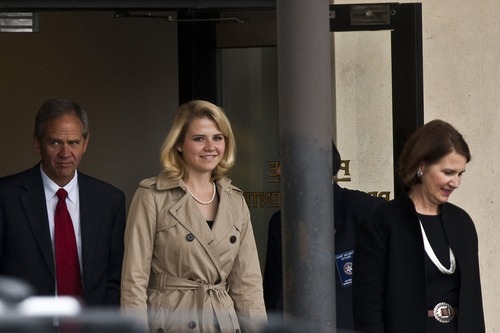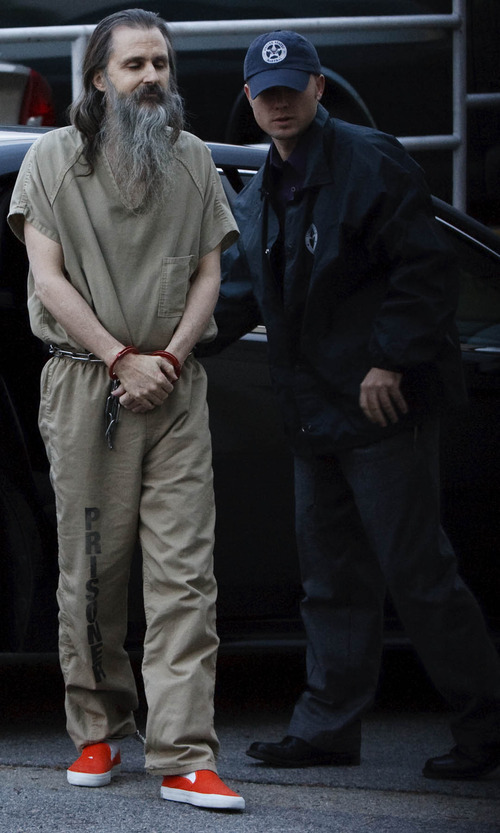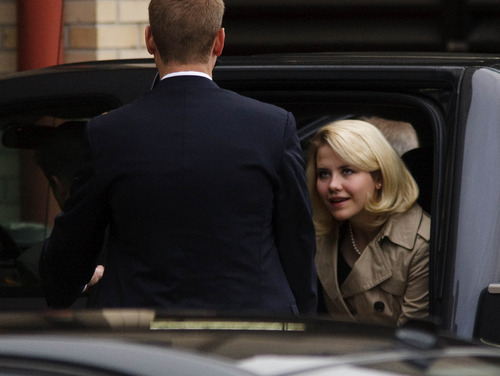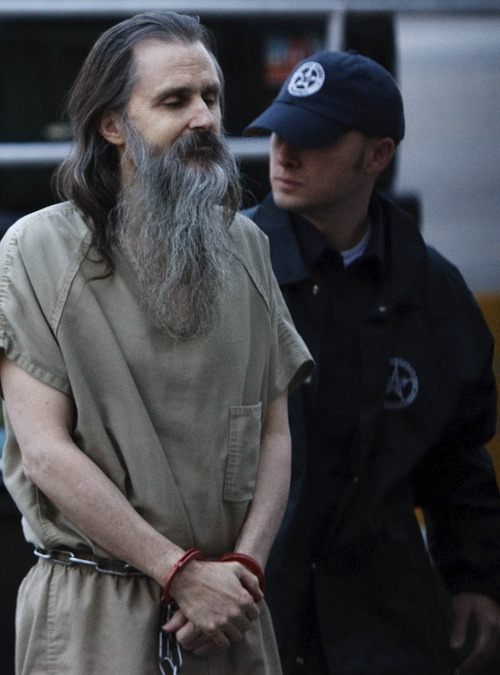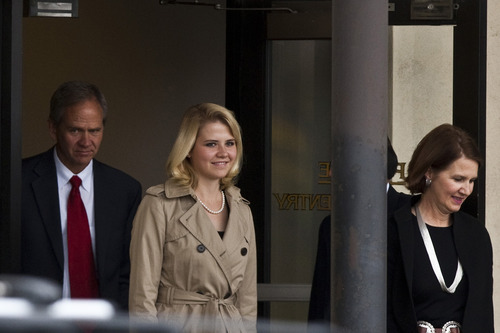This is an archived article that was published on sltrib.com in 2010, and information in the article may be outdated. It is provided only for personal research purposes and may not be reprinted.
Former Salt Lake City homicide Detective Jon Richey said Wednesday he has "no regrets" over the way he handled an August 2002 meeting with Brian David Mitchell that could have solved the disappearance of Elizabeth Smart months early.
"I don't see anything else I could have done," Richey told reporters after testifying at Mitchell's kidnapping and sexual-assault trial. "It's difficult for me, but I've lived with that — I live with that — and there's nothing I would have done differently."
Although a caller had reported spotting Smart wearing a robe and veil at the old Salt Lake City library downtown, Richey testified that Mitchell's calm demeanor convinced him she wasn't the missing 14-year-old. Richey's testimony, which followed Smart's third day on the witness stand, was aimed at cementing the prosecution's theory that Mitchell is a shrewd manipulator rather than a delusional zealot.
Richey testified in U.S. District Court that he went to the library and sat down next to Smart and Mitchell's wife, Wanda Eileen Barzee. Each was wearing a robe, headpiece and veil that revealed only their eyes.
Elizabeth's striking blue eyes had convinced the caller to alert police. But Richey told reporters he looked into them and "couldn't make the connection."
Richey testified he had arrived at the library believing it was "a long shot" for anyone to recognize a person from his or her eyes alone. He said nothing that occurred during his 30 minutes at the library convinced him otherwise, and he left.
Richey told the court he never looked under the veil because Mitchell wouldn't allow it, claiming it would have serious religious consequences for the girl. Richey said Mitchell also told him their religion, which he didn't specify, didn't allow the women to speak in public.
The officer said he watched Mitchell's reactions for signs of nervousness as Richey became more insistent about seeing the girl's face. He offered Mitchell the option of unveiling her in one of the nearby private rooms.
"I upped the pressure, one notch at a time, and got the same matter-of-fact response that this was not going to happen," Richey testified. He said Mitchell remained "calm, assertive and very much the same throughout the confrontation."
Richey added that he was cognizant of respecting the trio's civil rights and didn't feel he had enough evidence to force the girl to bare her face.
But Richey later told reporters: "Had I more information, anything at all that led me to believe it was Elizabeth, [civil rights] wouldn't matter. Her safety would be my only consideration. I would have taken off the veil."
He added that Mitchell claimed the girl was an 18-year-old relative.
"She was taller than I am, and she appeared to be about 18," Richey said.
Richey said he "manipulated the situation so she could have whispered in my ear."
He said he expected a kidnapping victim would take advantage of such an opportunity.
"But we now know there are other factors for why she did not," Richey said, referring to Mitchell's alleged repeated threats to kill Smart and her family if she tried to escape.
Richey told reporters that after Smart was rescued in March 2003 and he learned she was the girl wearing the veil, "It was absolutely traumatizing."
"At first, I felt responsible. I racked my brain about what else I could have done, should have done," he said, but he came to the conclusion that "with the information I had, there was nothing more I could do."
Richey, who now works as a bloodhound handler for the Unified Police Department, was the fifth witness for the prosecution.
Earlier Wednesday, Smart, now 23, concluded her third day of testimony by facing cross-examination.
Defense attorney Robert Steele's questioning of Smart was brief — just 40 minutes. It was also polite and fairly nonconfrontational, with Steele mostly seeking to clarify statements Smart made during direct testimony.
At one point, Smart thanked Steele — who, at times, referred to Smart's interview with a psychiatrist soon after her rescue — for refreshing her memory. Yet Smart bristled when Steele questioned her interpretation of Mitchell's intentions when he allegedly woke her holding a knife to her throat during her June 2002 abduction from her Salt Lake City home.
Smart said with an edge in her voice that she took it as a death threat: "I have no other idea how to interpret ... a knife at my neck."
During her three days on the witness stand, Smart testified about the harrowing nine months of captivity spent with Mitchell, now 57, and his wife, Barzee, 65. She recounted how Mitchell subjected her to near-daily rapes and forced her to drink alcohol and smoke marijuana after making the girl become a plural wife.
Prosecutors, seeking to counter the defense claim that Mitchell should be found not guilty by reason of insanity, have elicited testimony from Smart demonstrating the self-proclaimed prophet was focused on sex and alcohol, changed his appearance and mannerisms to suit the situation and had carefully planned her kidnapping.
During direct testimony Wednesday, Smart said Mitchell's behavior while intoxicated was similar to when he was sober, "only it was intensified a bit. He was crude and vulgar, self-serving. He was his number-one priority, followed by sex, drugs and alcohol, but he used religion in all those aspects to justify everything."
She said that, when alone with her and Barzee at their camp in the foothills above Salt Lake City, Mitchell would claim to be a prophet of God, the Davidic King, the One Mighty and Strong. But Smart said he never stated those views to others.
"He was very hypocritical," Smart testified.
She said she based that opinion on "nine months of living with him and seeing him proclaim that he was God's servant and he had been called to do God's work, and everything that he did to me and to my family is something I know God would never tell someone to do."
"I know that God loves each of his children and that we have our free agency, and that's why we are here. It is for us to choose what we do in our lives, and I never had that free agency in those nine months I was with him."
Asked by Prosecutor Felice Viti if Mitchell ever expressed any fear of cars, Smart said, "No. I remember him talking about cars and I asked him what his favorite type of car was, and he said if he had a choice, he would choose some type of sports car."
Viti's question was in reference to a statement by defense attorneys that, as a teen, Mitchell refused to ride in cars for fear of breathing exhaust fumes of other vehicles.
In his cross-examination, Steele attempted to bolster Mitchell's insanity defense with questions about his religious views.
Smart explained Mitchell's beliefs about The Church of Jesus Christ of Latter-day Saints, of which he was once a member.
"He said that the LDS Church was the true church, but they were also the most wicked church because they had the most truth and knowledge and that they went against it," Smart testified, apparently referring to the church's abandonment of polygamy.
Mitchell believed he would guide the church "back to the correct path," Smart testified.
When asked about Mitchell's motivation behind a failed kidnapping attempt of a California girl during the time the trio lived there, Smart confirmed that Mitchell referenced the attempt as a test of his faith.
Smart said Mitchell told her he would go to prison one day, but that upon his release, he would "be killed and lie dead in the street for three days, and then he would be resurrected and he would go on to fight the Antichrist."
The trial, before Judge Dale Kimball, will break for Veterans Day and Friday and resume on Monday.
Another encounterwith Mitchell
Deseret News employee Heidi Perry testified about her encounter with Brian David Mitchell in the summer of 2002.
Perry said she saw Mitchell taking down posters of Elizabeth Smart on the windows of the newspaper's lobby. Mitchell told Perry that Smart "had been found, and the poster didn't need to be up anymore," she testified.
When Perry told him she worked at the newspaper and would know if Smart had been found, she said Mitchell replied that he read it in the "other newspaper."
Perry described Mitchell's demeanor as "calm" as he kept tearing down the poster. When she ran upstairs to get help, Mitchell fled. —
Mitchell's jailhouse reaction
Brian David Mitchell told his stepdaughter Tuesday during a jail visit that he still loves Elizabeth Smart, still considers her to be his wife and believes she has been brainwashed by society.
Rebecca Woodridge told The Salt Lake Tribune that Mitchell made the statements after she asked him how he was doing. She said Mitchell rarely speaks to her during visits, but this time he said that he was "not a monster," "would never hurt his wife" and "one day, the truth will come out."
Shocked that Mitchell had referenced the trial, Woodridge said she told him, "You need to testify and say that," but he responded with "a glazed look."
Woodridge, who has been attending the trial, has said she wants to see Mitchell in a mental hospital rather than prison.
"I don't want him to get out," she said Wednesday. "I want him to get help."


